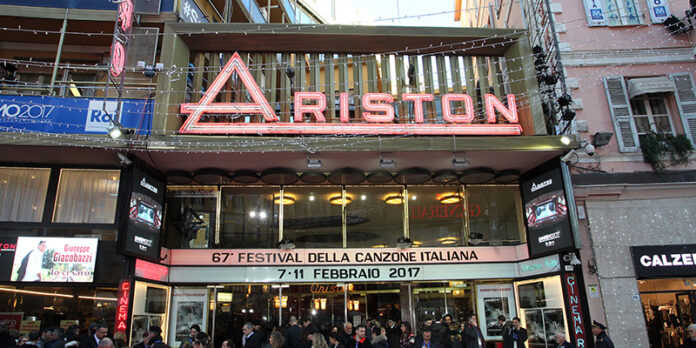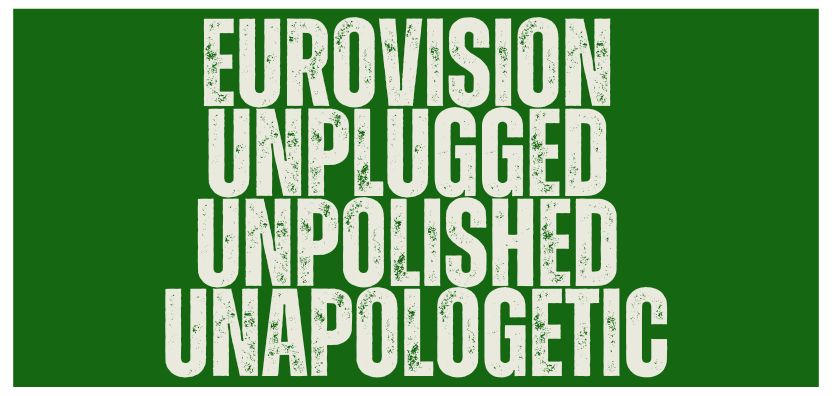
So, the exam question that everyone was answering on Feb 11th 2017 was :
“What is the difference between Spain and Italy in the Eurovision Song Contest?”
A very broad question I grant you, but overall the answer is … not much. They have both won the contest twice (1968 and 69 for Spain, 1964 and 1991 for Italy). They both have had excellent songs in the contest and too many of them to name here – but let’s start with Volare and Eres Tu for starters and go from there – they have both had long spells where they fell out of love with the contest, and in Italy’s case they walked away completely – but as of 2017 they are both part of the Big 5, and so are here as of right.
However, on this particular Saturday night, the gulf between two of the apparent leading lights in the contest was put under European scrutiny. And boy, that gulf in both class and professionalism was as wide as the Pacific Ocean.
Why the fuss?
Festival della Canzone Italiana di Sanremo, the five night behemoth that begat the reason why you are reading this prose, has never been about the Eurovision Song Contest for Italy or Italian fans. In many ways to them it is what Mediocrityfestival is to Swedes, a national song contest for people of their nation.
Hardly ever has the Italian song been picked from this contest, but the singers that have graduated from it read like a who’s who of Italian Eurovision. The contest, held in the Teatro Ariston, was sold out for weeks with season tickets on sale for €1300 for all five nights.
Compare that, if you will, to Objetivo Eurovision, a 90-minute made for television show that it can be argued even RTVE don’t want to put on. They realised that fans of the contest and the Spanish public do indeed have an appetite for the contest, and grudgingly did it anyway.
The appearance of RTVE throwing this contest together in order to fulfil an obligation is in marked contrast. Objetivo Eurovision is also relatively young – only two years old. Spanish public selection shows, however, are nothing new.
Already the demarcation lines are clear. One organisation has pulled out all the stops to make sure that everyone knows that San Remo is on, and that the winner gets first refusal at the contest. Objetivo Eurovision is supposed to be young and vibrant, but like all Spanish finals feels like someone going through the motions.
And what about the songs?
Spain’s song entry process was convoluted, to say the least. Five songs went straight to the final, and one song from an eventual shortlist of 30 went through three stages of internet voting. This included streaming online (rather than any tv coverage). The lucky singer joined the other five.
From what research I have done, hardly any of the composers are well-known.
Compare that to Sanremo, where among the relative unknowns, there is a fairly wide smattering of big-name Italian composers, including Emma Maroni – who represented Italy in Copenhagen.
As you can imagine, the quality of the songs is clearly tilted in the Italian favour.
Why you talking the s*its, Colclough?
All of this up to now has been pretty standard Eurovision stuff that you all know about. Sanremo is a popular well-known contest with established conventions. People know what they are going to get. Objetivo Eurovision is essentially a TV show.
“Why then,” you’re asking me, “are you telling me this?”
The answer is simple and is endemic across the Eurovision spectrum.
Any contest and any selection will only be as good as the songs invites to participate. More importantly how broadcasters go about getting those songs is just as important.
RTVE’s laissez-faire approach has led to a disconnect between the viewing public and the broadcaster (of which more later in spectacular fashion). Put simply, they don’t know what the Eurovision is anymore and, from the outside at least, it appears they don’t give two figs as to what the viewing public think.
In contrast, since RAI came back to Eurovision and studied what the contest is about, they have been, on the whole, looked like they might be trying to win.
Indeed, it could be argued that Spain’s outlook NOW is like what RAI’s used to be – before they went away.
Results are everything … just make it look fair
RAI’s selection method, though complex, was deemed fair. Five nights of songs, all of which had jury and televoting, a knock-out round where the bottom four were forced to sing for their supper, and the right to stay in. There was a covers round where they didn’t sing their own songs. The final night was taken up with six hours of contest with a jury, televote and Italian record buying public jury. There was a super-final with the top three having to go round again and plead for votes.
It was almost barbaric in its duration, and the lengths that the singers had to go to to ensure that they just got asked to represent Italy were immense.
Cruel and unusual punishment? Yes, but for both viewers and songwriters.
And in Spain?
RTVE’s contempt for the viewers and the contest was finally unmasked on 11 February, by the criminal way in which their song was chosen.
Firstly, they had a jury of three. In a ballot-stuffing exercise that Ferdinand Marcos would be proud of, two out of the three jurors appeared to be sympathetic to one of the entries … namely Manel.
Indeed, if the chatter is to be believed, one of them had even been talking Manel’s chances up before the final. So much for a veil of impartiality.
The jury voted first and, predictably, the two hometown judges gave maximum points to Manel … and the lowest possible score for his only real contender, Mirela. The other judge seemed to be playing by the rules, and gave full points to Mirela, putting Manel in second place.
This meant there was a 12-point gap going into the televote. This carried three times as many votes as a single juror, presumably to maintain the illusion of fairness.
Manel came third, meaning that Mirela had to win the televote to tie – which she duly did.
Did they rely on televoting decided the winner. Just like in the Eurovision (and nearly every other national final in history)? Well not really, because Spain recently changed the rules to ensure that the jury would pick the winner; and with the two home-town votes up against Mrs. Fairplay, Manel was duly returned as Member of Eurovision for the Spanish Broadcaster.
So what’s the result?
One of the songs picked last night songs is a professionally written, well performed, bit of fun. Most definitely not a joke entry. The other is the Spanish song.
It won’t come as a surprise to many that the Twittersphere went into metdown with vitriol being espoused from every Spaniard – and most of Eurovision fandom. Everyone seemed to agree. The decent song with the monkey* won. The other one was a bit of twee pop from a tween that decides that everything he does he does it for you, his lover, because you are probably his one and only.
In May, Europe will judge. Manel must be at least four furlongs in front of everyone else in a race to the bottom of the board. Let’s face it, any jurors that haven’t been bought off are hardly likely to vote for his bit of nonsense over a well-written song.
Italy seem to be on course for the win they have been scoping out for at least the last four years.
* For the record, the Italian song is about the hectic lifestyle that the west leads juxtaposed against the calm of eastern religions. It suggests that when humans are backed into a corner the animal instinct is roused (hence the monkey).






Wonderfully written article, witty and with appropriate degree of humour. It’s because of these occasional gems that I am following the blog.
Now the key question of course is how much of Spanish jurors behaviours we will see in Eurovision. Il Volo was dilligently drowned by some jurors in favour of we know whom. Loreen and other heavy ammunition is being dragged by Swedes to clinch that seventh title. What would they do with another annoyingly talented Italian act on the way?
I think you just nailed it and hopefully this year the Spaniards will not bother you :))
The Italian song is fabulous, but the monkey will get lost if no one understand the lyrics and than people might think this an “act” while the monkey is inherent to the song.
The Spanish song is, right now, candidate number 1 for last place.Saving the Germans from this fate.
@Maclaren – Il Volo were dragged down by the juries because they were not top notch on the jury’s final.Something Phil can testified on.He was there and directly called it out